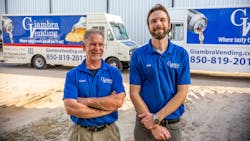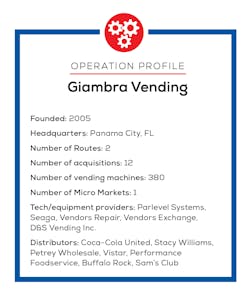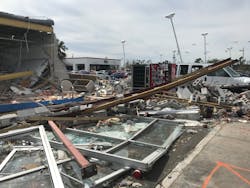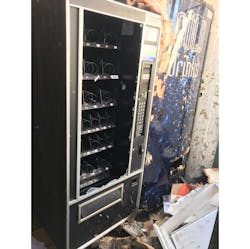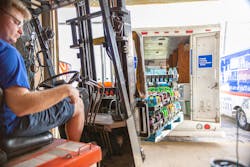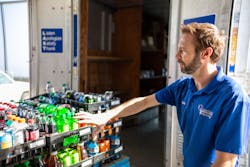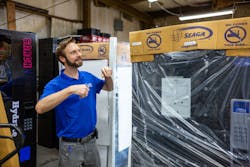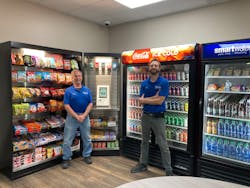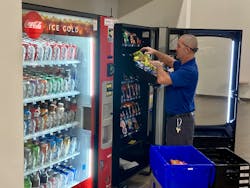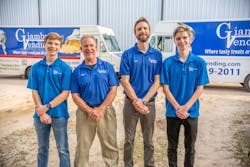Giambra Vending achieved the $1 million revenue milestone in 2021, up 40% over the prior year, and 2022 is off to a strong start. The nearly two-decade journey has been everything but smooth sailing, but the Florida vending operation has persevered through unprecedented challenges. And with its recent foray into micro markets, cashless payment and prekitting, owner Josh Giambra is optimistic that there’s plenty more growth ahead.
In fact, Automatic Merchandiser has given Giambra its vote as one of its inaugural “40 under 40” award recipients, which recognizes outstanding young individuals making a difference in convenience services.
Josh Giambra started his vending business part-time in 2005 at age 20, with the help of his father, Charles Giambra, in Panama City, a small sport-fishing coastal town on Florida’s panhandle. He was in college with a full-time job as a pizza delivery driver, and his dad worked full-time as a marketing sales representative.
A search for a side venture led them to a “blue sky” business opportunity that promised overnight success with three Red Bull vending machines. The prime locations they’d hoped to secure didn’t pan out and revenue was slow, so they branched out beyond those locations and added honor boxes to their route, which thankfully exceeded the fledgling operators’ expectations and helped them affordably expand into more locations.
“I remember sitting on the floor the first time we counted the collections and we felt like we hit the big time!” Giambra recalled. The operators continued to expand their honor box placements and used the revenue to reinvest in the business.
They purchased a batch of used equipment from a supplier they tracked down in Mobile, Alabama, for $750 a machine that turned out not to be location-ready as promised. So Giambra taught himself the tricks of the trade and refurbished the equipment himself.
“I learned that I could figure it out. I realized that buying a refrigeration deck was only one-third of the cost I had paid someone to repair the unit,” he said. “Then, we vigorously searched surrounding areas for people we could buy cheap machines from and we refurbished them ourselves and kept saving and investing.”
The operators ramped up their efforts to expand the business both organically and through acquisitions, fueling several years of growth. Revenue in 2013 rose 42% from a year earlier, and Giambra became the sole owner of Giambra Vending, with Charles remaining a route driver ever since.
In 2009, Giambra left his day job delivering pizza, and in 2015 he left his second job (fun fact) playing the role of a pirate on a family adventure cruise and intensely pursued growing his vending business. Remaining committed to the core values of integrity, flexibility and superb customer service, on which he and his father founded Giambra Vending, he had 330 machines in his arsenal by 2018.
Hurricane strikes
Business was rolling along until October of that year, when over the course of a few hours, Category 5 Hurricane Michael hit, causing Giambra Vending to lose more than 100 machines and one-third of its revenue. The storm caused catastrophic damage to the city and surrounding communities. Numerous homes were flattened, trees fell over a wide swath of the panhandle and strong winds caused extensive power outages across the region.
The Giambras learned the hard way how important it is for a vending company along the Emerald Coast to be prepared as best possible for a hurricane of such magnitude.
“They thought it would be a Category 2 on Tuesday afternoon, so we ran our routes, did a light restock, collected money, and parked our trucks in front of the building to help protect glass windows. And then it became a Category 5,” Giambra recalled. “Trees fell on our house and we had no power or water for 30 days. We had no cell service to check on our family to see if they were OK. Most roads were impassable.”
The first thing the operators did was secure their homes and then made their way to check on loved ones they could reach in person. Next, they drove to the outer reaches spared by the hurricane where there was cell service to call their remaining relatives and friends and found all were safe.
Finally, they trekked into the office to find that the facility and trucks were thankfully less hard hit than their homes were. The father and son operators kicked into action and loaded their trucks with snacks and drinks and distributed them to the many people caught off guard unprepared and without food throughout the devastated community.
Vending machine rescues
Giambra then began assessing the damage to their equipment, where he could, and performing “vending machine rescues” at buildings that were still standing, wearing waterproof, steel-toed boots and wading through ankle-deep water in many cases.
“At every machine where people could, they had smashed the glass to get to snacks, like it was an apocalypse,” the operator recalled. “It was a race to save every machine we could, along with money and product in them. They were demolishing buildings with our machines in them. With the help of my wife, Christy, we tried to assess at least 10 machines a day, for product, money and damage.”
With cell service out for weeks, Josh would return to the office after each day’s machine rescue missions and leave a note for his father, instructing him which machines to service and which were beyond salvageable.
“In three hours, we lost a third of our business, which we had worked so hard for,” he said. “All we could do was do things old-school on paper and get the machines that we could filled.”
It took three weeks to take inventory of all 330 machines. The operators were forced to move 100-plus machines, some working, many not, out of shuddered buildings and those under construction, all within a few months. Giambra just picked up the last two machines damaged by the hurricane at a building where the elevator was only recently repaired.
Lessons learned
The operators learned how to best prepare for the inevitable hurricanes in the future and have their protocols in place. Instead of having a three-day supply of water and food on hand, they will have enough to last at least a week.
In the event of an impending hurricane, Giambra will also pull all snacks from its glass-front machines and shut them down. “It’s not feasible to bring all machines back to our warehouse, or we would have that as the plan,” Giambra commented.
The operators have also installed cameras in their warehouse so they will know if power is out for four hours or more and dispose of any refrigerated food.
The operators also take pictures of their trucks, machines and warehouse when a storm threatens for insurance purposes and now have loss of income insurance.
“We now train our employees how to go ‘old school’ without technology if power is out,” he said. “They know the most important thing is to make sure their families are safe should anything happen. Then, if we can make it to the office, we’ll leave hand-written notes to each other to communicate.”
Technological leap
Just before the hurricane, Giambra had partnered with Parlevel Systems to implement its vending management system and make the move to install cashless readers.
“I give Parlevel hearts, asterisks and stars for moving us to a VMS and cashless, along with micro markets and soon prekitting. I’m in love with them!” Giambra exclaimed. “When it was me and my dad and 50 machines, we used sticky notes and pens. When there are other people involved and 100-plus machines, Excel spreadsheets would take years for us to ever know if we’re short. Parlevel can go to the nickel what should be in the machine.”
With the VMS in place, Parlevel facilitated the company’s move to cashless with a scalable approach, since outfitting all of its 300-plus machines at once was neither affordable nor practical for the small but growing company.
Giambra Vending operated six machines at a mall that seemed to be the ideal testing ground for cashless.
On Oct. 8, 2018, the credit card readers were up and running. On October 10, Hurricane Michael hit and the mall was among the locations destroyed, with cell service lost before Giambra could even assess the performance of its cashless payment trial.
The first message Giambra received when he reached an area with cellular service was from Parlevel. The technology company saw that all of the machines in the mall were offline and wanted to see if everything was ok. Being a supportive partner, they were ready to help any way they could.
When the machines were finally back online, Giambra Vending was impressed with the results and upgraded its machines with cashless acceptance in phases and just recently completed installing the technology on the last of the machines in its fleet.
All of the company’s machines and its office coffee service are also now on Parlevel’s vending management system. More recently, Giambra Vending expanded Parlevel’s technology to its first micro market kiosk and started prekitting mid-March.
“We’ve never used any other VMS platform and have no reason to. I only know 50% of its capabilities and there’s so much more we can grow into,” Giambra said. “Their system can order for us once our warehouse is set up, which we’re working on. And with OCS and pantry with Parlevel, customers can go online and order and they have proven at the hardest of times to be there with great customer service and support.”
On the rebound
Heading into 2020, Giambra Vending was well on its way to a great comeback with year-over-year revenue increases of 45% and machine placement higher than before the hurricane.
“It took a year to get on our feet after the hurricane. People built new buildings,” the operator recalled. “We saw traction and growth and got new accounts as more businesses opened.”
Its next big push was to dive into office coffee service to round out its services to its clients and sustain the company in the off season from November to February when vending sales are typically down. The operators took out a small business loan to purchase equipment and expanded swiftly into OCS and pantry and were met with enthusiasm as customers signed on for the services.
COVID strikes
Then the pandemic hit, locations shut down and revenues plummeted. Office coffee business was the hardest hit with empty offices and social distancing making breakroom refreshments in the least demand.
“This warehouse had never been so organized and clean! Revenue was down; places were all closed, we had all this product and we were sitting around twiddling our thumbs organizing the warehouse like never before,” Giambra recalled.
So with his “make lemonade when life hands you lemons” approach to inevitable challenges, Giambra worked with Parlevel to offset his company’s losses, continue to serve his customers, and help other companies in the same boat.
It took just seven weeks to launch Parlevel Run, an online ordering platform through which Parlevel partnered with Shopify to offer local home delivery of products, including drinks, snacks, paper towels, toilet paper and cleaning supplies, that were in high demand and short supply, from the vending company directly to the consumer.
But just as the system got up and running, the stay-at-home orders lifted and the majority of people wanted to get back out rather than stay in, making Parlevel Run less successful than anticipated, but that just inspired the operator to push harder. Giambra Vending still offers the online ordering service for shipping but not local home delivery, which brings in some incremental business.
Once accounts began to open back up, Josh stood by the company’s core values to continue to grow.
“Luckily, Florida was not shut down for too long with COVID,” Giambra said. “Before COVID, we had just hired a new driver, Chris. Tapping into our savings and utilizing the Paycheck Protection Program loan helped get us through a time of low revenue and we were able to keep everyone employed.”
Growing strong
Giambra Vending has grown both organically and by acquiring a dozen small routes over its 17 years in business, some with as few as one to two machines and others with as many as 40. Today, the company operates just shy of 400 machines and is in a steady growth mode.
The operator holds high standards for his machines, most of which have undergone extensive upgrades, since he has picked up a lot of legacy equipment through acquisitions.
The company invests exclusively in Seaga vending machines for its new equipment. Giambra Vending also partners with Coca-Cola as a third-party operator.
Friendly competition
From the beginning, Giambra has shared the knowledge and skills he gained along the way to help his fellow operators. He has a strong commitment not only to his customers but also to anyone in the industry who reaches out for his assistance, and he continues to take all of his calls personally.
“I always try to help other vending companies, and I see my competitors as colleagues,” he commented. “I’ve even worked on their machines, sold them parts, given advice, and have had the opportunity to buy many of them out. We’re all in this together. I have been helped by other companies and colleagues in the industry, and I want to be able to share that knowledge with others.”
Logistical challenges
The good news is demand for convenience services is back in full swing. Despite some locations that have shifted to remote work not having full staff onsite, and some that have gone fully remote, there are plenty seeking Giambra’s vending and growing OCS and pantry services as never before to cater to employees in a market where it’s tough to find and retain talent.
But one of the biggest challenges Giambra is grappling with, like everyone in every industry, is supply chain disruptions, leaving it short of key products and equipment.
“Getting products has been incredibly challenging. If we get 60% of our order on almost every order, we’re lucky,” the operator lamented. “We have empty slots in machines. We can only double up on so many.”
Becoming tired of seeing empty slots in his machines, he decided to branch out from strict planograms and contacted his distributor and asked if they could substitute out-of-stock items with something else in their warehouse with every order. “We’ve also reached out to untraditional distributors like grocery, c-store and even restaurant distributors,” he said. “We are now ordering from seven different distributors. It’s a lot to manage, but it’s better than not having any product at all!”
Giambra has also been navigating supply chain shortages that have led to long delays receiving new vending machines.
“We started the ordering process from Seaga in August and we only recently received the last of the machines in mid-March; that’s how bad it is. They have no control over the delays and challenges either, and it’s a ripple effect,” he remarked. “There are so many obstacles to navigate because the supply chain is daunting to overcome. The good news is that everyone knows about the supply chain challenges everywhere in their lives. I’m thankful that my customers have been so patient and flexible waiting for their equipment, and understanding when we just can’t get the exact products they want.”
Micro market debut
Giambra Vending opened its first micro market in 2021 at an existing technology company it served in Fort Walton, Florida, two hours away from the vending company’s headquarters, that requested the transition from vending.
“We are very happy with our first market and so is the location. There are no coin or bill jams or product hanging. They just scan the item, so there are relatively no issues and it’s OK that we are two hours away,” Giambra commented. “Our goal is to respond to any service call within 24 hours, which we are able to manage, but we’re also looking for someone local to oversee the location and others as we continue to expand.”
Before opening his first micro market, Giambra had done his homework and determined three rules in order for a location to qualify for his investment in installing and operating a self-checkout store, which requires a $3,000 monthly minimum in revenue.
First is that if there’s any shortage from theft, the location is liable to pay Giambra or to terminate the employee who stole. The second is that the location absorbs the cost for spoilage of any fresh foods items. And the final rule is that the location has a pest-control contract, and if not, the location must pay for an extermination service should there be any issue.
“One of our core values is flexibility so this system lets us manage spoilage,” Giambra said. “For micro markets, the account has to meet the minimum revenue agreed upon; if they don’t, they are billed for the remaining balance.”
Onward and upward
Giambra Vending has recently added prekitting to its warehouse operation and is in the process of reconfiguring the layout for the proper flow and adding shelving for drinks and snacks, with Parlevel’s guidance.
Giambra Vending employs one full-time driver, Chris, along with Josh’s father Charles and has just hired its first full-time warehouse employee, Ryan, to support its move to prekitting. Giambra’s two sons, Thomas and Kaden, also help in the busy summer months.
“Next will be a service technician and then a bookkeeper/secretary,” Giambra said. “Not being fully staffed, I’m the service tech, the bookkeeper, the warehouse guy, and I wear so many other hats, so it’s tough to keep growing and let customers know all we offer when I can’t get out and tell them. That will change soon once we’re able to make these new hires.”
The operator has also taken the time to lay out his plans for his business 20 years ahead, which he says will be critical to keeping it on track for the growth and success he anticipates.
“Since this was just a side venture in the beginning, I didn’t plan anything for the first 20 years and have learned how important it is to have an end in mind and a plan for one, five, 10 years and 20-year goals and not just go through the motions of getting through each day,” he summed up.
With all of life’s uncertainty, Giambra says one certainty is that by committing his company to its core values, adapting to new technology, and working closely with other operators for the good of the industry as a whole, he will continue to keep his business growing. ■
Emily Cambriello
Emily Cambriello is a business journalist who has devoted much of her career to covering the convenience services industry. She is a contributing editor to Automatic Merchandiser/VendingMarketWatch.com.
